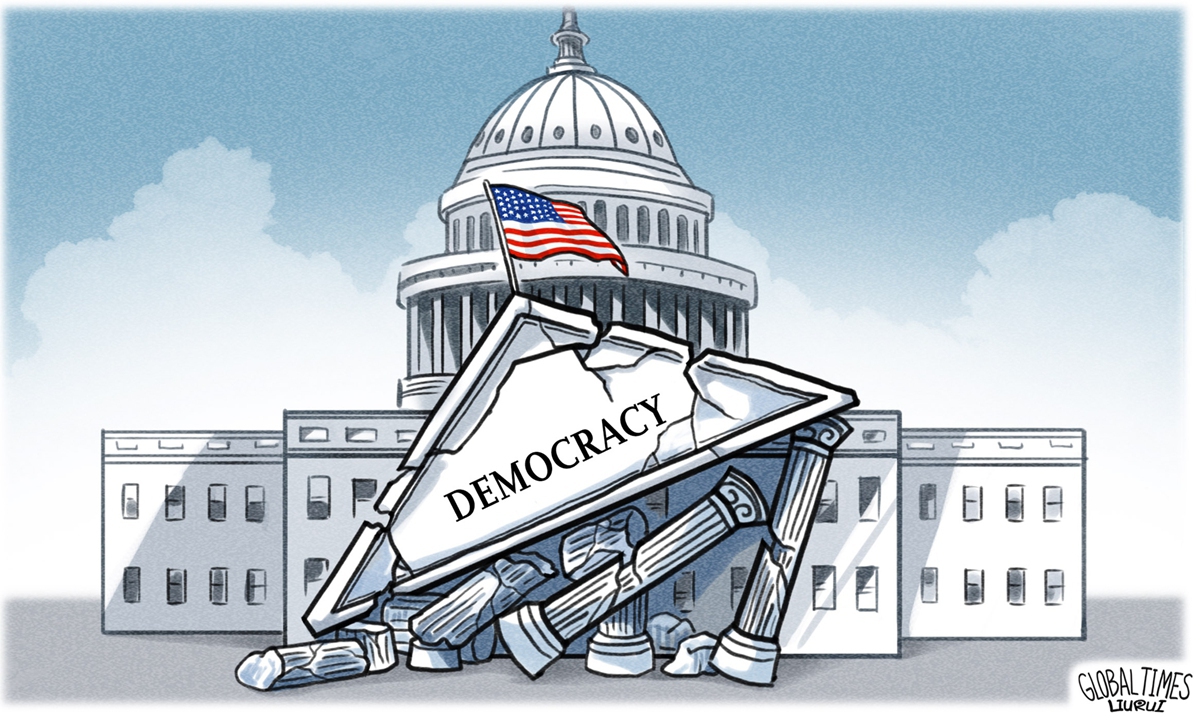
Illustration: Liu Rui/Global Times
What is regarded as political dysfunction of the US may be the normalcy and the true face of US-style democracy.
The New York Times on Tuesday published a piece entitled "The World's Democracies Ask: Why Can't America Fix Itself?" written by Damien Cave, the paper's bureau chief in Sydney, Australia. It claims that "many of the democracies that once looked to the United States as a model are worried that it has lost its way."
It is not so much that US-style democracy "has lost its way" as that the international community has lost their confidence over the US as well as its system, Lü Xiang, research fellow at the Chinese Academy of Social Sciences, told the Global Times.
Washington is beset with all kinds of difficulties, ranging from political polarization and social division to racial discrimination and gun violence. In regard to its foreign policy, the US has repeatedly provoked clashes and even wars across the world. A lot of countries and regions, even including many of Washington's allies, no longer regard the US as a reliable country and have lost their confidence in its so-called democratic system.
Just as the Chinese Foreign Ministry Spokesperson Zhao Lijian said last year, "The US democracy is not an exemplary model but a broken one." The result of a New York Times/Siena College poll indicates that 28 percent of all voters said they had little to no faith in the accuracy of this year's midterm elections. According to a recent Quinnipiac University poll, 69 percent of Democrats and 69 percent of Republicans think the country's democracy is on the brink of collapse.
The core of US-style democracy lies in its electoral system, but an increasing number of citizens believe that this system is not effective. Many Americans have been aware that through their existing system, they cannot elect a qualified person to lead the country.
To a large extent, this is because when any president takes power, what comes to his mind first is not how to solve problems, correct mistakes, safeguard national interests and protect people's welfare, but how to maintain partisan interests and consolidate power. This is an upside-down governance approach. US democracy has become politicized and turned into a weapon for political infighting, casting a wedge between politicians and the public. In this context, US' internal contradiction will only intensify. US politics is in a morbid state.
In the eyes of today's US voters, the US so-called democratic politics, as well as its electoral system is to pick a less rotten apple among two baskets of rotten ones. The US society tends to have an increasingly deep understanding of the drawbacks of their democratic system. Ironically, US political elites are still attempting to export such a system, which will expose themselves to ridicule among an increasing number of countries across the world.
According to Shen Yi, a professor at Fudan University, US democracy was always like that, only that the "filter" is gone.
For a long period, the US was far ahead of other countries in terms of economic and material levels. With its material advantages, the US plundered wealth in the world, and then described the accumulation of wealth as the product of US democracy, trying to prove its superiority. Relying on the huge gap of materials between other countries and the West, it has made up a system of knowledge and public opinion, under which it propagates that the US' strength is brought about by its so-called democratic system, and touts the "self-correction" function.
But in fact, there is little public record of any big mistake throughout US history being self-correcting through its system. What we have seen is just the opposite. Donald Trump is a president who has made mistakes, and in theory President Biden should correct them. But where are the corrections? Shen asked.
The problem does not lie in whether US-style democracy "has lost its way," but with the relative decline of US' strength and the rise of emerging economies, coupled with more contradictions and several limitations of US-style democracy. These problems can no longer be covered up by the "filters."What we see now is actually the true color of US-style democracy.



